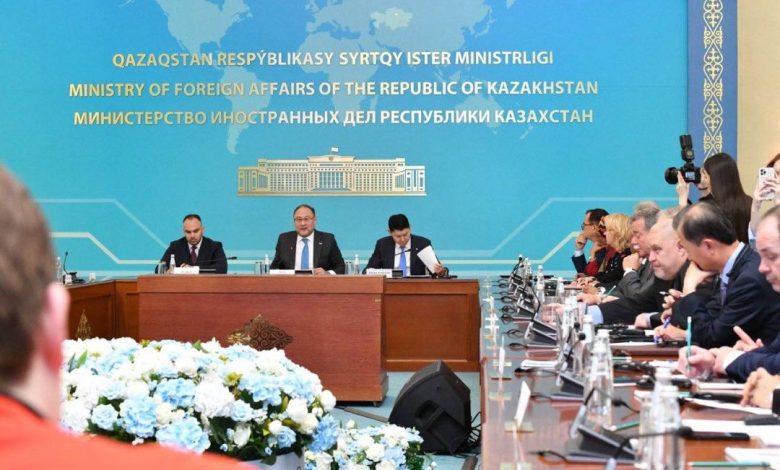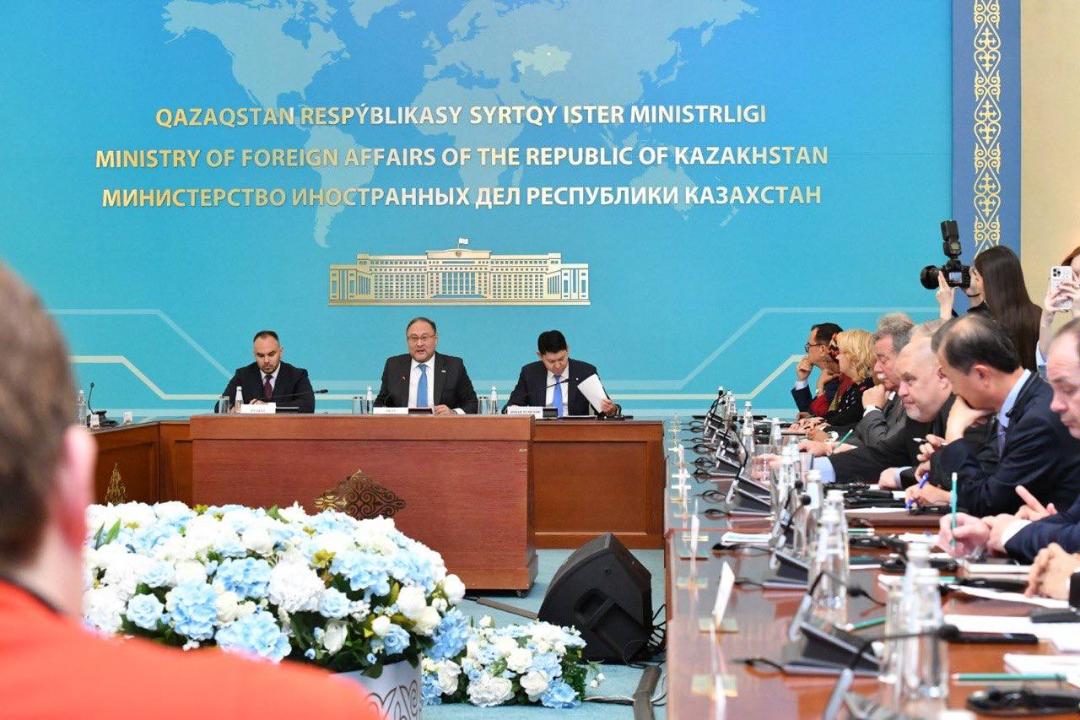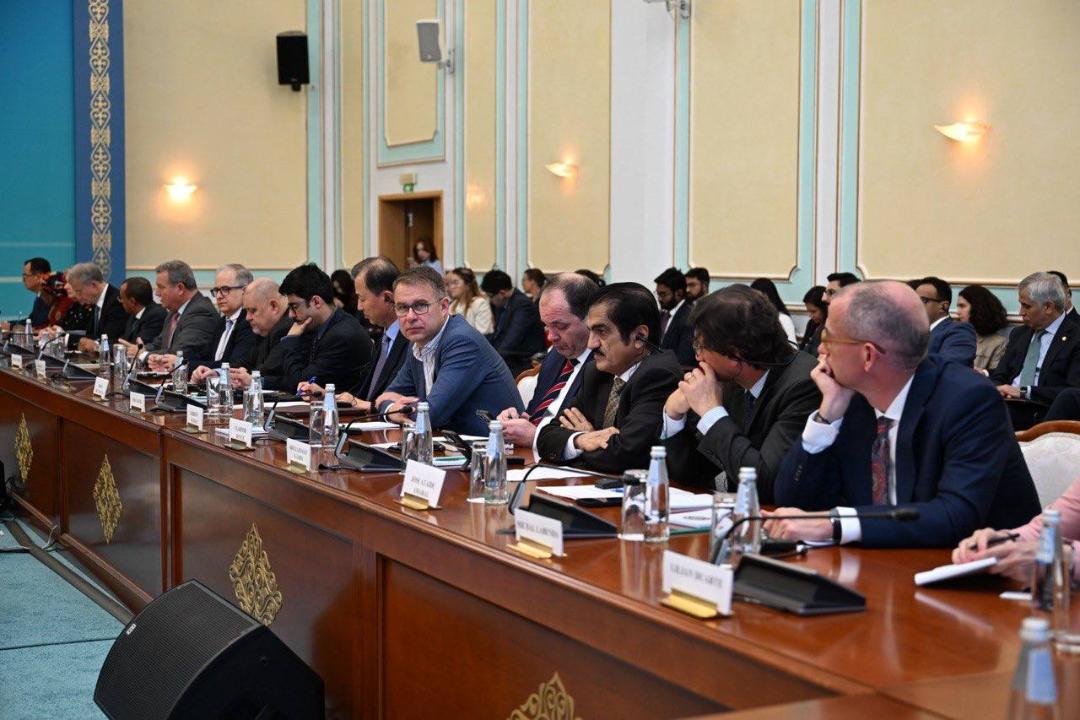Kazakhstan Reports Progress on UN Resolution on Women, Security, and Peace to Diplomatic Corps

ASTANA – The Ministry of Foreign Affairs of Kazakhstan in cooperation with the Ministry of Culture and Information presented updates on the implementation of United Nations Security Council Resolution (UNSCR) 1325 regarding women, peace, and security to the diplomatic corps in Astana on Oct. 1.

Vice Minister of Information and Social Development of Kazakhstan Yevgeniy Kochetov, First Deputy Minister of Foreign Affairs of Kazakhstan Akan Rakhmetullin, and Director of the Multilateral Cooperation Department of Kazakh Foreign Affairs Ministry Didar Temenov opened the briefing. Photo credit: Kazakh Ministry of Foreign Affairs/gov.kz
Representatives from the Ministry of Culture and Information, the Ministry of Defense, the Ministry of Internal Affairs, and the Ministry for Emergency Situations discussed the achievements and challenges in applying UNSCR 1325, with a focus on supporting qualified women in military, peacekeeping, and peacebuilding roles.
Current Engagement of Women Across Ministries
Azamat Sisatov, head of the Peacekeeping Division at the Department of International Cooperation in the Ministry of Defense, emphasized that there is no discrimination against women in terms of gender equality and opportunities within the armed forces.
“Equal rights are guaranteed for all categories of service personnel, including equal pay for equal duty. There are no distinctions between men and women in the army,” Sisatov stated.
Currently, 6,802 women serve in Kazakhstan’s armed forces, including 863 officers. This group comprises 31 colonels, 112 lieutenant colonels, 235 majors, 203 captains, 173 senior lieutenants, and 109 lieutenants, with the remaining approximately 6,000 women serving as privates and sergeants.
“Women are predominantly assigned to roles such as liaison officers, lawyers, medical and financial personnel, interpreters, educators, office managers, and trainers. Excluding enlisted soldiers, women comprise around 16% of the armed forces,” he noted.

The diplomatic corps gathered at the Ministry of Foreign Affairs to hear on the progress of implementation the UNSCR 1325. Photo credit: Kazakh Ministry of Foreign Affairs/gov.kz
Major Rimma Shakeyeva, who served in the UN Mission for the Referendum in Western Sahara (MINURSO), shared her confidence in women’s ability to withstand challenges alongside their male counterparts and their positive contributions to peace and security.
“Women are involved in all aspects of peacekeeping as part of military, police, and civilian personnel, positively influencing the environment in which peacekeeping operations are conducted. They play a vital role in advancing women in peacebuilding and ensuring the protection of women’s rights. Women peacekeepers have proven they can perform the same functions as their male counterparts under equally difficult conditions,” Shakeyeva explained.
In 1993, women represented just 1% of deployed military and police personnel. By 2019, that number increased to about 5% of military personnel and 11% of police personnel among approximately 95,000 peacekeepers in UN missions. A target has been set for 15% of military contingents and 25% of military observers and staff officers by 2028, according to Shakeyeva.
“The greater the involvement of women in such operations, the more effective peacekeeping becomes. Women peacekeepers enhance overall performance, facilitate access to communities, promote human rights, protect civilians, and encourage women to engage meaningfully in peace and political processes,” she stated.
Shakeyeva also highlighted the critical importance of women’s full and equal participation in conflict resolution, peacebuilding, humanitarian responses, and post-conflict reconstruction.
Since 2018, Kazakhstan has been sending female military personnel to peacekeeping missions as military observers, staff officers, and as part of military contingents. Women serve in missions such as MINURSO, the UN Interim Force in Lebanon (UNIFIL), and the UN Disengagement Observer Force (UNDOF), which maintains the ceasefire between Israeli and Syrian forces in the Golan Heights. This year, Kazakhstan deployed its first independent peacekeeping contingent to the Golan Heights.
“Women peacekeepers can access the population, including women and children, to interview and support survivors of gender-based violence. This access provides critical information that would otherwise be difficult to obtain. Diversity among UN peacekeepers enables them to engage effectively with all community members they are tasked to protect,” Shakeyeva noted.
Rinat Zulkhairov, deputy chairman of the Administrative Police Committee of the Ministry of Internal Affairs, stated that developing a gender-sensitive approach to professional development remains a priority.
“We actively promote female employees to senior positions based on their performance and moral qualities, as well as their experience within internal affairs. Currently, more than 11,000 women serve in internal affairs, comprising over 15.5% of the total workforce. Importantly, over 600 women hold senior positions,” Zulkhairov said.
He added that women also serve in specialized units, such as police patrols and rapid response teams, demonstrating their significant role within the internal affairs sector.
Ergali Bahayev, colonel and chief of staff at the Ministry for Emergency Situations, affirmed that the ministry is committed to empowering and supporting women in alignment with UNSCR 1325.
“Currently, 2,527 women are serving in civil protection roles, despite the constant risks and psychological challenges involved,” Bahayev stated. He also mentioned the ministry’s training programs designed to enhance the skills and capabilities of women in civil protection roles, equipping them for leadership positions.
International Perspectives (OSCE, World Bank)
Volker Frobarth, head of the OSCE Programme Office in Astana, noted that the OSCE facilitated the adoption of Kazakhstan’s National Action Plan for UNSCR 1325 in 2021.
Frobarth commended Kazakhstan’s proactive measures in appointing gender advisors across all governmental levels, highlighting their role in guiding and overseeing policies to ensure gender perspectives are integrated into decision-making processes.
“These advisors play a crucial role in guiding, overseeing policies and ensuring that gender perspectives are included in the decision making processes. However, there is still a significant need to further institutionalize gender sensitive approaches throughout the government’s operations. Implementing gender budgeting is an essential next step to ensure that our financial allocations support gender equality objectives, effectively addressing disparities and promoting inclusivity across all sectors,” said Frobarth.
Hana Brixi, global director for Gender at the World Bank, praised Kazakhstan’s efforts to empower women across various sectors.
“From our analysis, Kazakhstan has made commendable progress, achieving perfect scores in areas such as women’s mobility, rights in marriage, and property and inheritance rights,” Brixi noted.
She identified areas for further improvement, particularly regarding women’s work after childbirth, women’s entrepreneurship, gender-based violence, and access to financial support for childcare. These, she said, are areas where the World Bank is increasingly active, helping countries improve regulatory frameworks and institutional policies while strengthening services to support women and communities.

